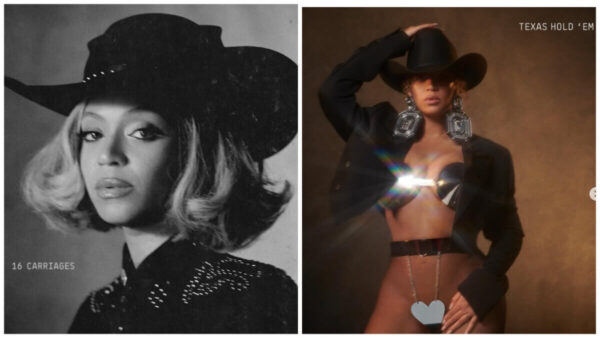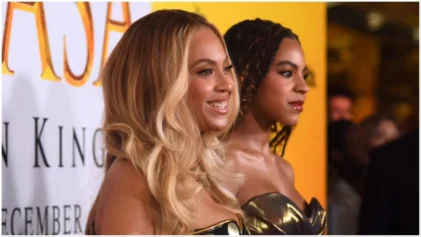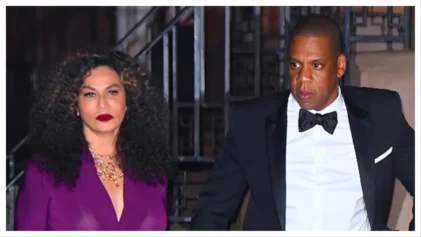Questions about Beyoncé’s plans for the second act of her three-part Renaissance were answered during the Super Bowl when she revealed new music was dropping in a post-halftime Verizon ad, which reportedly cost the phone service provider $30 million.
What happened next signaled the BeyHive to get into line dancing formation: the release of two country singles, “Texas Hold ‘Em” and “16 Carriages.” The full act is due out on March 29.
Fans ascertained that the singer has been hinting at ushering in a country era since she was denied proper acknowledgment for tapping into her Southern roots for “Daddy Lessons,” a song featured on her 2016 album “Lemonade.”

The Texan performed the track with country music’s one-time sweethearts-turned-politically-outspoken group, the Dixie Chicks, at the 50th annual Country Music Awards that same year. Racist backlash soon followed, with some claiming the global superstar did not belong in the genre.
A similar sentiment was seemingly supported by the Recording Academy when their country music committee rejected her “Daddy Lessons” song as a submission for categories like Best Country Song and Country Solo Performance, according to The Associated Press.
So when Taylor Swift puts out entirely pop albums but wins country awards it’s all good but Beyoncé is making ‘country inspired’ music when it’s just legit country? Make it make sense. https://t.co/DtsRAgfY1a
— Holly McNeill (@Wally_Holly15) February 12, 2024
The Grammys have previously come under fire for repeatedly denying the entertainer Album of the Year, instead awarding white peers (her nominations are: “Renaissance” 2023; “Lemonade” 2017, “Beyoncé” 2015, and “I Am…Sasha Fierce” in 2010). At this year’s ceremony, her husband, Jay-Z, called out the Academy for snubbing her AOTY, yet bafflingly making her the most-awarded artist in history with 32 Grammy wins.
“Act II,” as explained by fans, means “Beyoncé is really out here reclaiming genres originally rooted in Black music. First house, now country, and then rock & roll (rumored) next Like I’m just so happy to witness & live in the same lifetime as the greatest musical act of all time S—T.”
Additional clues that supporters noticed were the rodeo theme of her 2021 Ivy Park drop being. The campaign featured real-life Black cowboys, as well as actor Glynn Thurman. “The inspirations came from the overlooked history of the American black cowboy … these Black rodeos showcased incredible performers and helped us reclaim our place in western history and culture,” she told Harper’s Bazaar.
As well as various Western themes seen in the rollout for “Renaissance” and costumes worn on the world tour. “She wanted to reappropriate Americana and country music from a Black perspective,” claimed tour designer Es Devlin in a British Vogue interview.
in july 2022, beyoncé shares “renaissance” album art and teaser which has heavy western influences even though it’s a dance album with disco, r&b and electronic elements. pic.twitter.com/ofoYyOfTiS
— BEY-Z🐝 (@beyzhive) February 5, 2024
“Beyoncé collaborated with all of these incredible black musicians for this country album oh baby the racists and wannabe country music gatekeepers are gonna be even more UPSET!” read another tweet from an ecstatic supporter of Beyoncé’s country exploration.
Black folk musician Rhiannon Giddens is prominently featured playing the banjo and viola in “Texas Hold ‘Em” and is revered for educating people on the history of instruments being rooted in Black culture. Musician Robert Randolph, a steel guitarist, appears on “16 Carriages.”
Despite white acts dominating the genre for decades, in recent years multiple Black artists such as Mickey Guyton, Jimmie Allen, Willie Jones, Ireland, Brittney Spencer, Tiera, and K. Michelle (formerly known for her R&B records) have each shaken things up with their presence in the country music scene.
Guyton, in particular, has been vocal about the racism she endures as a prominent Black country artist who has broken barriers. Despite critics’ opposition to her success, she remains steadfast in pushing for equality and acceptance.


